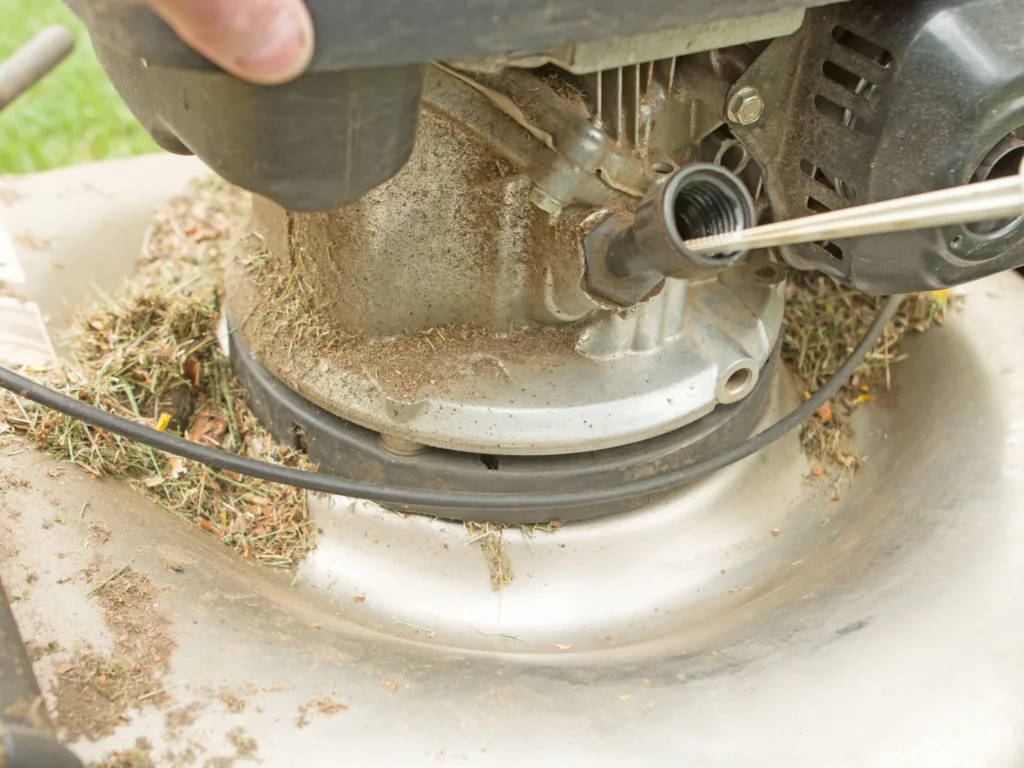Oil is as essential as fuel in a petrol mower. Without oil – and without the right oil, for that matter – the engine will overheat and seize, possibly leading to permanent damage.
In this guide, we’ve answered the common question: “What oil does a petrol mower need?” We’ve discussed the different oil types and the recommended oil for various petrol lawn mower engines.
✅Key Takeaways
Changing the engine oil is an essential part of lawn mower maintenance.
There are several types of oil used in lawn mowers, graded based on a scale developed by the Society of Automotive Engineers (SAE).
The type of oil your mower engine requires depends on the outdoor temperature and the type of engine. Oils with a SAE 30 grade are generally a safe bet, but check your mower’s user manual to be sure.
Two-stroke engines work best with a small engine oil, while four-stroke engines need a thicker motor oil.
Table of Contents
🤷🏻♂️ What Are The Types Of Lawn Mower Oil?
Lawn mower oil is available in various grades, which are determined by their viscosity. The grade of oil you choose for your mower will influence its performance under different temperature conditions – thinner oils are faster-flowing compared to thicker oils when used at the same operating temperature.
The specific type of oil you need depends on a few factors, including the type of mower and engine you have and the outdoor temperature.
Different lawn mower oils have their own codes consisting of letters and numbers – definitely confusing to the everyday gardener. Essentially, these codes help us to understand how the oil type will perform in certain conditions based on a scale developed by the Society of Automotive Engineers (SAE).
Here are a few things you should know about mower engine oil codes:
The higher the number in the code, the worse the oil flows in higher temperatures.
In multigrade oils, the number before the letter “W” tells us the viscosity (resistance) of the oil at low temperatures, while the number after the “W” tells us the viscosity at higher temperatures.
In single-grade oils, which have a constant viscosity, there’s no letter “W” – just a number.
Now you know the basics about the codes used for different types of lawn mower engine oil, let’s look at the most common oil codes and what they tell you about the suitability of the oil for a particular situation:
📊 Oil Comparison Chart
| Oil Code | Single/Multi-Grade | Description | Operating Temperature |
|---|---|---|---|
| SAE 30 | Single-Grade | Suitable for warmer temperatures, air-cooled small engines | Ideal for warmer temperatures |
| SAE 10W-30 | Multi-Grade | Best for cold temperatures, ideal for cold-starting engines | Ideal for cold weather |
| SAE 5W-30 | Multi-Grade | Great for cold temperatures due to low viscosity | Ideal for very cold weather |
| Synthetic SAE 5W-30 | Multi-Grade | Suitable for both hot and cold temperatures | Suitable for summer and winter |
| 15W-30 | Fully Synthetic | Intended for commercial use, wide temperature range | Wide range of operating temperatures |
SAE 30
SAE 10W-30
SAE 5W-30
Synthetic SAE 5W-30
15w-30
🧐 Single-Grade Vs Multigrade Mower Oil: What’s The Difference?
When you’re shopping for lawn mower oil, aside from the confusing codes (which you should now be able to decipher!) you’ll come across two oil types: single-grade and multi-grade (or multigrade) oil.
Differentiating between these oil types is pretty straightforward: single-grade oil has a consistent viscosity across a narrow temperature range and is suitable for specific temperature conditions, while multigrade oil offers versatility by adapting its viscosity to a broader range of temperatures, meeting the requirements of multiple grades.
Multigrade oils are more flexible and capable of providing reliable lubrication in various weather conditions, making them a popular choice for lawn mowers in the UK because they offer improved starting at low temperatures (i.e. early spring) as well as high temperatures (i.e. mid-summer).
Because of its additional performance and versatility benefits, multi-grade oil is more expensive than single-grade alternatives.
🧬 Synthetic Vs Conventional Oil: Which Is Best?
Also consider whether you prefer to buy synthetic oil or conventional oil for your lawn mower. You’re probably wondering, what’s the difference between regular and synthetic oil, and which is best?
Synthetic oils are the preferred option in most scenarios because they’re more refined, consistent, and much lower in impurities, enabling them to better support your mower engine’s performance. Synthetic oil also has a longer lifespan and requires less frequent changes, which is undeniably convenient (does anyone actually enjoy oil changes?).
Conventional oil is derived from crude oil and has not had impurities removed. It’s cheaper, but it’s not as healthy for your lawn mower’s engine, and it usually needs replacing more frequently. We recommend buying synthetic oil when possible for your lawn mower.

2️⃣ What’s The Best Type Of Oil For A Two-Stroke Lawn Mower?
The best lawn mower oil type for two-stroke engines is a lightweight small engine oil.
During the warmer spring-autumn period, you can go for a SAE 30 oil. In winter, switch to a SAE 10W-30 oil, which is better suited to colder weather.
Wondering what oil we recommend? We like this semi-synthetic oil, especially since it comes with a free fuel mixing bottle to make the job easier.
4️⃣ What’s The Best Type Of Oil For A Four-Stroke Lawn Mower?
The best engine oil for mowers with four-stroke engines is a thick motor oil.
Go for a 10W-30 grade oil year-round, which should allow for optimal combustion engine performance during the warmer and colder temperatures throughout all four seasons. Go for a synthetic oil when possible.
If you’re curious to know what we use, we’ve always had a good experience with the Briggs & Stratton 100008E 4-Stroke Lawn Mower Engine Oil.

🤔 How To Know What Oil Type Is Right For Your Lawn Mower
To know for certain what type of lawn mower oil is right for your mower model, check your user manual.
This should advise on one or several types of engine oil that are best suited for your mower’s engine type. If you can’t find this info, contact the manufacturer directly. Using the wrong type of oil will lead to costly and often permanent damage to the mower engine (as we’ve discussed below).
🛢 What Happens If You Use The Wrong Oil In Your Petrol Lawn Mower?
There are a few potential outcomes of using the wrong oil type in your petrol lawn mower:
You’ll struggle to, or fail to, start the engine when using the mower in temperatures that the oil isn’t designed for.
The mower engine may be inadequately lubricated, increasing heat and friction and leading to excessive wear and tear.
This may also result in engine damage or failure.
The mower is more likely to stall or malfunction when used in different temperature conditions.
How about if you put two-stroke oil in a four-stroke lawn mower engine, and vice versa?
You can breathe a sigh of relief if you’ve accidentally put two-stroke oil in a four-stroke engine. Nothing much will happen, although the fuel will be a bit thin, so its lubrication properties will be lacking.
However, if you put four-stroke oil in a two-stroke engine, prepare for serious and instantaneous damage. The oil will affect the engine’s ability to combust, causing it to degrade. Expect to see a lot of smoke when you start the engine. You might have to buy a new lawn mower.

🧪 How Much Oil Do Petrol Mowers Need?
The amount of oil you’ll need for your petrol mower depends on the specific make and model of the mower’s engine.
Typically, most small petrol mower engines require around 0.5-0.6 litres of oil.
To be on the safe side, consult your mower’s manual or check the manufacturer’s recommendations for the precise oil capacity for your particular mower, rather than assuming that a random guy on the internet is definitely right (although I try).
Remember, using the correct amount of oil is essential for proper engine lubrication and performance. Overfilling or underfilling the oil could damage your mower’s engine and reduce its overall efficiency.
It’s a good idea to change your petrol mower’s oil when you service it, so you get into a routine. Oil changes are, after all, easy to forget about.
🏁 Final Word
Hopefully, you’ve found everything you needed to know about the best oil for your petrol lawn mower.
If you liked this article, you might also like:
